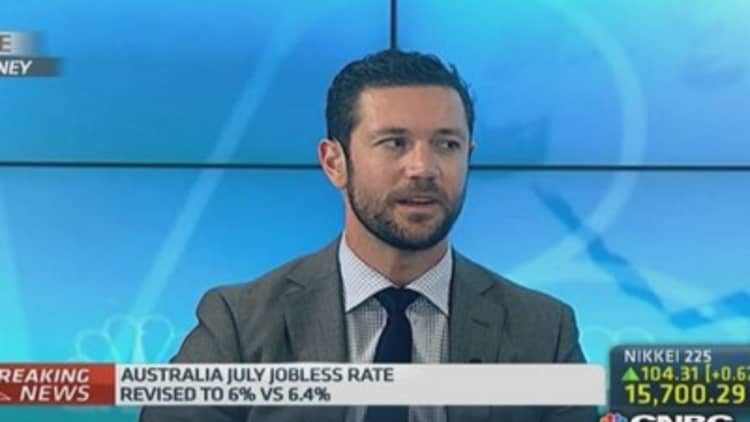Australia's central bank said the labor market remained subdued but had stabilized somewhat this year, adding it had based its assessment on a range of data given the volatility in the official labor force survey.
In minutes of its Oct 7 policy meeting, the Reserve Bank of Australia (RBA) also reiterated that the most prudent course was to maintain a period of stability in interest rates.
"Given the information available, the Board's judgement was that the current stance of monetary policy continued to be appropriate for fostering sustainable growth in demand and inflation outcomes consistent with the target over the period ahead," the minutes said.
The RBA this month left its cash rate unchanged at a record low 2.5 percent, where it has been since August last year.
Read MoreConfusion aside, Australian job market still soft
The central bank said while forward-looking indicators pointed to modest employment growth in the months ahead, there was still a degree of spare capacity in the labor market and it would be some time before the jobless rate declined consistently.

The minutes revealed that Board members had noted a further pick up in lending to housing investors in recent months and discussed the importance of banks maintaining strong lending standards as well as the ongoing dialogue between the RBA and APRA on this matter.
The RBA said continued accommodative monetary policy should support demand and help growth strengthen over time.
"To date, this had been most apparent in the housing market, where dwelling investment had picked up and was expected to remain strong following the rapid rise in housing prices and high levels of approvals," the minutes said.
In recent months, RBA stepped up its warning that record low levels of interest rates risked stoking unwelcomed increases in home prices and debt.
Read MoreAustralia's economy: from mining to building
On the Australian dollar, the central bank said it remained high by historical standards, particularly given the recent declines in key commodity prices.
The drop in iron ore prices, to their lowest since September 2009, was discussed by Board members.
"The decline over the past year had reflected a combination of increased Australian and global supply and, more recently, some softening in the growth of Chinese demand for steel, perhaps resulting in part from weaker conditions in the housing market," the minutes said.
Read MoreChina steel demand shrinks for first time in 14 years asslowdown stings
"Members noted that most Australian iron ore production remained profitable at these lower prices and that increased pressures on global higher-cost mines would be expected, in time, to lead to reductions in their production."
The RBA said most of the country's major trading partners had continued to grow at their long-run average pace over the past year, although there had been quarterly volatility in growth in some major economies.
The central bank said while some indicators showed China's economic conditions had softened a little, "members were briefed that the Chinese authorities had scope to ease policy if needed to support GDP growth."
Read MoreChina GDP may reignite global growth panic
Member also noted a recent pick up in financial market volatility from very low levels, predominantly in currency markets.

